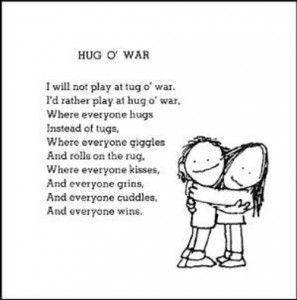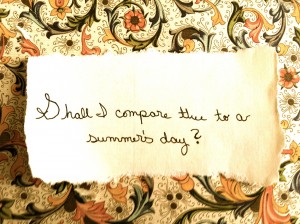Plagiarism vs. Copyright Infringement

Plagiarism and copyright infringement often get confused together, which makes sense. The two are often used interchangeably, and they often pop up together. If you plagiarise something, you’ve probably also committed copyright infringement. However, this is not necessarily true, and it doesn’t hold the other way around either. That is, when people commit copyright infringement, they usually haven’t committed plagiarism.

Hug O’ This Is Copyright Infringement
So what’s the difference?
Plagiarism is when a person presents another’s ideas as their own. So if I were to copy a Shel Silverstein poem and submit that to a publication or to a teacher as something I wrote, that would be plagiarism: I am pretending that I wrote the poem when really I did not. I can also commit plagiarism, though, if I simply stole someone’s idea. For example, lets say I have a friend who tells me about a great idea he has for a novel. If I were to then turn around and steal his idea without adding anything new of my own or getting his permission, that would also be plagiarism.
Now, in the two examples I’ve given, one is also an example of copyright infringement while the other is not. Can you guess which? Copying Silverstein’s poem is infringing on his copyright. But lets say that instead of submitting his poem to a competition I just want to put it up on my website? I also say in big bold letters, “poem by Shel Silverstein.” Is this plagiarism? No. I’m not pretending I wrote it. Is this still copyright infringement? Yes, because I did not get his permission. Think of copyright as a piece of land. If you want to do something with someone’s land, you have to get their permission first. If you don’t get their permission, then you’re trespassing.
On the other hand, you can’t copyright an idea. If my friend tells me his awesome novel idea and I write it up without his permission, I’ve committed plagiarism but not copyright infringement. In order to copyright something, it has to be something you can either see or touch.

Yes, as long as you give proper attribution
But what if instead of copying Shel Silverstein I copy Shakespeare and tell everyone I wrote it?
That’s plagiarism but not copyright infringement. Why? Because Shakespeare and his descendants no longer own a copyright on his work. A copyright exists only for a certain length of time. In the United States, anything published before 1923 is no longer copyrighted. Due to changing laws, today if you write something, you will hold that copyright (unless you transfer it to someone else) all the way to the day you die. After you die, your descendants will own that copyright for another 70 years.
Ok, so why does this all matter?
Copyright infringement is a type of theft and actionable in a court of law. Plagiarism, though, is not actionable by itself. I can plagiarise somebody, but unless I committed copyright infringement, I committed no crime. Although, it’s certainly sleazy! Moreover, most people tend to view plagiarism as many orders of magnitude worse than copyright infringement. With copyright infringement, it’s usually by accident or it’s so small that it’s hardly worth anyone’s time (if you’ve ever used a picture of a Disney character as your avatar on a website, you’ve committed copyright infringement!). With plagiarism, though, the plagiarizer is purposefully telling people something that’s not true, and no one likes that.
If you have any questions or comments, fire away!










I am trying to create an adaptation of a book in English in my mother tongue Gujarati and planning to publish it in Gujarat only. I have made some changes to fit the mindsets of learners in Gujarat. However, it almost follows the same layout, sequence and words in English along with Gujarati translation. Is it copyright infringement?
I’m afraid it probably is! What you are doing is creating a translation (though somewhat edited) of somebody else’s book. You aren’t actually writing your own.
When books are translated into another language, the original author still gets paid for them because the book is still theirs.
In my poetry classes, we used to experiment with translating foreign poetry and re-positioning the words, but my tutor was always reminding us that where more than 10% of the words belong to someone else, we’re probably looking at a legal battle. He would say it’s fine to do for fun but not something you can get published.